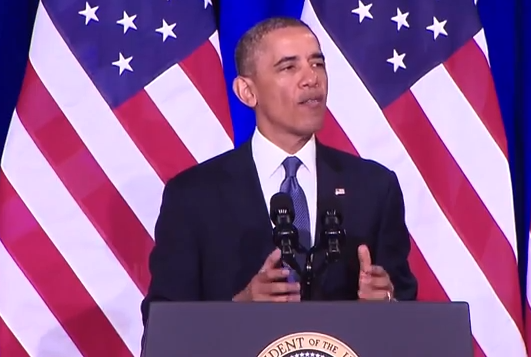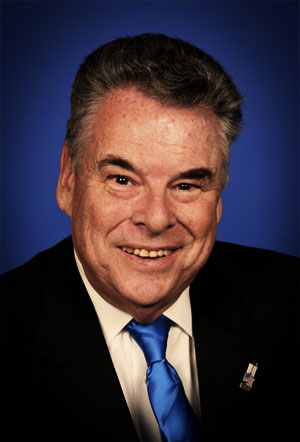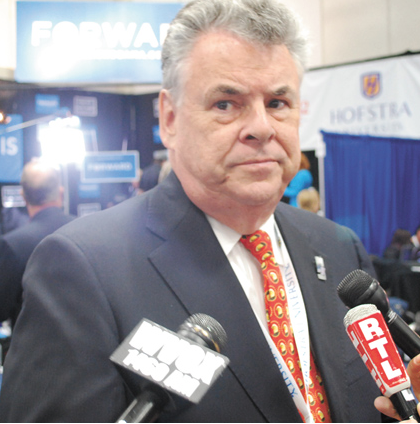
NSA officials appear to be “relieved” and satisfied with several key changes that President Barack Obama outlined in a highly-anticipated speech Friday regarding surveillance at home and abroad, according to a homeland security expert from Long Island.
“They’re not delighted, but they’re satisfied,” Rep. Peter King (R-Seaford), the former chairmen of the House homeland security committee, told the Press. “They feel they can make this work.”
King, who was sitting in the second row behind NSA chief Gen. Keith Alexander during Obama’s speech at the Justice Department in Washington D.C., said that he “certainly got the impression from them that they can live with everything that was proposed today.”
“If you would ask them a month or two ago what was going to happen I think they were expecting a lot worse,” he said.
The most significant changes coming to the NSA include moving the bulk data stored by the agency as part of its “metadata” program to a third party, establishing a panel of advocates that will represent the public at the secretive Foreign Intelligence Surveillance Court—an effort to make proceedings more transparent—and discontinuing electronic surveillance of allied heads of states.
Obama was not only speaking to the American public, but also foreigners who have grown concerned about the United State’s ability to store phone data beyond its borders. The president said he was taking the “unprecedented step” of extending certain protections afforded to Americans to people overseas.
Though the president made some concessions, his remarks did not appease many privacy advocates calling for wholesale changes to the NSA’s spy dragnet. Critics were particularly disheartened that Obama didn’t further limit NSA’s ability to collect massive amounts of phone data.
“The president’s decision not to end bulk collection and retention of all Americans’ data remains highly troubling,” the American Civil Liberties Union said in a statement shortly after Obama’s speech. “The president outlined a process to study the issue further and appears open to alternatives. But the president should end–not mend–the government’s collection and retention of all law-abiding Americans’ data.”
During his remarks, Obama fiercely defended the NSA’s techniques as essential to preventing attacks both at home and abroad, while also appearing sensitive to criticisms from privacy advocates who have aggressively condemned the spy agencies perceived invasive tactics.
“We have to make some important decisions about how to protect ourselves and sustain our leadership in the world, while upholding the civil liberties and privacy protections that our ideals and our Constitution require,” Obama said. “We need to do so not only because it is right, but because the challenges posed by threats like terrorism and proliferation and cyber-attacks are not going away any time soon.”
“They are going to continue to be a major problem,” he continued. “And for our intelligence community to be effective over the long haul, we must maintain the trust of the American people, and people around the world.”
Specifically, Obama said the millions of pieces of data collected under the metadata program collection—phone numbers, times and length of calls—would be handled by a third party. But he added that storing the data with phone service providers or another entity “pose difficult problems.”
Obama charged U.S. Attorney General Eric Holder and officials within the intelligence community to develop options to safely store data. They were ordered to report back to him an alternative approach before the program comes up for reauthorization on March 28. The change in strategy will require Congressional approval.
He is also calling on Congress to authorize and establish a panel of advocates from outside government to “provide an independent voice in significant cases before the Foreign Intelligence Surveillance Court.”

Obama also ordered the NSA to transition away from its existing program of pursuing phone calls from a number associated with a terrorist organization from three steps to two.
While taking a swipe at other countries for feigning surprise over the leaks from former NSA contractor Edward Snowden that mentioned surveillance of heads of state, including German Chancellor Angela Merkel, Obama said the United States will no longer monitor the communications of leaders and governments of close allies.
“Now let me be clear: Our intelligence agencies will continue to gather information about the intentions of governments—as opposed to ordinary citizens—around the world, in the same way that the intelligence services of every other nation does,” he said. “We will not apologize simply because our services may be more effective. But heads of state and government with whom we work closely, and on whose cooperation we depend, should feel confident that we are treating them as real partners. And the changes I’ve ordered do just that.”
Overall, King said he was “satisfied” with changes coming to the NSA, but admitted there would be no reforms if it was up to him.
“I think the system works,” he said. “I think it’s constitutional and no rights have been violated so I would’ve made no reforms. Having said that, considering all that was being said before hand, to me the system is basically in tact.”
King added that he’s concerned about extending privacy rights to foreigners, especially those who the U.S. may want to monitor if “it’s a person we’re not sure of.”
“As an American,” he said, “I want to have the right to monitor that person’s conversations.”



































